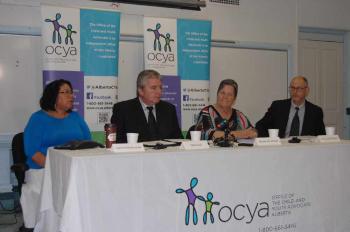Image Caption
By Shari Narine
Windspeaker.com Contributor
EDMONTON
Three Indigenous children five years and younger dead. Three mothers charged in their deaths. Twelve siblings from three families now in foster care or kinship care.
This may all have been prevented if the Children’s Services Ministry had provided intensive, sustained support when those children, along with their siblings, left foster care and were returned to their mothers.
That is the basis of the three recommendations brought forward July 18 in Three Young Children, the latest investigative report issued by the Office of the Child and Youth Advocate (OCYA).
The report examines the deaths of Sarah, 5, Anthony, 2, and Mikwan, 1, (all pseudonyms) occurring over a 14-month period beginning in September 2014.
Similar concerns were outlined in an investigative report delivered by the OCYA in October 2016 (focusing on nine-month-old Sharon) and the special report Voices for Change in July 2016, which examined the needs of Indigenous children in the child intervention system.
While the government accepted the recommendations, Advocate Del Graff said he was still waiting for action to be taken.
Today’s report sets out in the strongest language used by Graff yet that the Children’s Services Ministry and the Alberta government are failing to respond with the speed necessary to make a difference in the lives of the most vulnerable children.
“I think my references are becoming a bit harsher because in many ways I’m not feeling that the government is hearing the recommendations and acting on them in the way I hoped that they would,” said Graff.
He added the recommendations from his office were not unrealistic.
“The recommendations that we are making are doable and achievable recommendations…. We’re just asking for a plan. That’s not too complicated or difficult to produce,” he said.
The plan called for in Three Young Children would ensure that the specific needs of the children returned to their birth families were met and that birth families received a continuum of care comparable to the level of support their children received while in foster care.
“The wellness of family is the place where children are going to be okay and so sometimes that support is withdrawn too quickly. So the family, with evidence of wellness at the point where they can return the child, is just a point in time. It isn’t a picture of sustainability and we withdraw that support before we’re sure about what is going to happen,” said Sharon Steinhauer, program lead for Social Work at Blue Quills University.
Steinhauer, along with Bent Arrow Traditional Healing Society executive director Cheryl Whiskeyjack and University of Alberta, Department of Paediatrics professor Dr. Lionel Dibden, served as subject matter experts for Three Young Children.
Each of the three children had been removed from their homes at very young ages as their parents struggled with addictions, domestic violence and neglect concerns.
When they were returned with their siblings, after their respective parents had taken steps to improve their situations, the focus turned to helping the families and not dealing with the specific risks each child faced.
“Reunifying children with their parents is a new phase of involvement, not an ending,” said Graff.
Sarah, 5, died from serious injuries while in her mother’s care and approximately two months after child intervention involvement ended. She had previously been in care for four years. Sarah’s mother was charged with second-degree murder and a preliminary hearing is upcoming, said Terri Pelton, director, investigations and legal representation for Children and Youth.
Anthony, 2, died after suffering a cardiac arrest and multiple unexplained injuries in the care of his mother for three months. He had been taken into care shortly after birth and remained in foster care for about two years. His mother was recently sentenced when she pleaded guilty to manslaughter.
Mikwan, one, died from complication of acute blunt trauma to his head. He had been in the care of his mother for approximately two months. He had been in foster care for just over one year. His mother was incarcerated after pleading guilty to manslaughter.
“I believe that children belong with family; and, I am concerned that the tendency following tragic situations such as these can lead to fewer children being reunited with family,” said Graff, who stressed that children could only be returned successfully if there was a plan in place and supports available.
“A number of initiatives are underway to help address these issues, including enhanced funding to reduce caseloads, strategies to help caseworkers improve safety when considering a placement for a child and a program in four of our seven regions, which requires ongoing supports for 12 months prior to ending a permanent guardianship,” said Health Minister Sarah Hoffman, in a statement issued on behalf of Children’s Services Minister Danielle Larivee.
“We will be working towards expanding this program throughout the province. Children’s Services is also undertaking an internal review into cases involving tragedies at the time of reunification.”
Wildrose Shadow Children’s Services Minister Jason Nixon called the stories of the three children “heartbreaking” and said they were “yet another reminder of just how important it is to make constructive changes to our child intervention system.”

